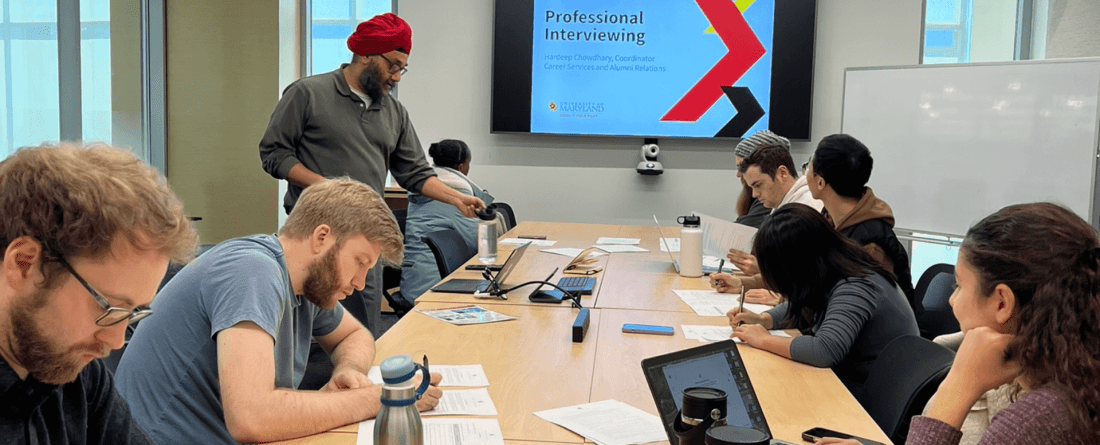
When Bryan Kempton, director of career services and alumni relations, received his Master of Education in Higher Education Administration, he knew he was destined to continue university life. Upon joining the Career Services team at SPP twenty years ago, Kempton marveled at the passion and drive of policy students and their career aspirations and knew he could offer valuable guidance as they started to plan their futures.
As consumers in higher education, policy students seek out specialized, tailored services to guide them in their career search. “They expect to find experts on campus that have a tangible advantage for them to get a start in their career from the moment they step foot in the Career Services office,” explains Kempton. “We help students to see and understand that they have a team of people supporting them.”
Over the past two decades there is one mistake, Kempton observes, that students make the most frequently in career searches, which is thinking that job searching is a solo activity. When it comes to networking, there are many people, including faculty and staff, in place to ensure the success of every student. Alumni and employers with whom Career Services has built relationships over the years are also strongly invested in student success. Employers utilize these relationships as internship and career recruitment tools for their company, organization or agency. Once students understand that and incorporate that mindset into their internship or job search, things start to fall into place.
Hardeep Chowdhary leads a seminar on professional interviewing.
Some internships lead students to full-time jobs. This is precisely what the federal government was aiming for when they created the Pathways Programs, notes Kempton. Through its internship program, recent graduate program, and presidential management fellows program, the federal government invites talented students and recent graduates into federal employment.
Kempton, along with Hardeep Chowdhary, coordinator of career services and alumni relations, encourages students to use internships as a developmental tool to help them figure out what careers they do (or don’t) want to pursue upon graduation. “If a student really dislikes an internship, they’re still learning valuable information about that particular sector or area of public policy,” asserts Kempton.
There are skills and career assessments that Career Services offers which give students clarity and focus as they determine their desired career path. The Strong Interest Inventory Assessment and the Myers-Briggs Type Indicator are assessments that gauge students’ personalities and interest patterns which proves valuable as students consider their paths forward and where their passions lie. Kempton and Chowdhary regularly meet with students to help them decipher these career assessment results and navigate the world of internships and job searching. They emphasize the importance for students in understanding blind spots in career decision-making, how to capitalize on their personalities in job searches, and the difference between personal and professional interests.
Students love getting off campus and hearing directly from the experts.Bryan Kempton
Always a favorite, Career Treks are another tool in a policy student’s career arsenal. Arranged by our Career Services team, groups of SPP students visit Washington DC area organizations to learn more about their role in the policy world. “Students love getting off campus and hearing directly from the experts,” says Kempton. Prior career treks include visits to the Democratic National Convention, Booz Allen, Annapolis city government, and the Amtrak Office of Inspector General where they also took a background tour of the Amtrak station. “These organizations have hired our policy students and used this as a recruitment mechanism. It’s a great opportunity to learn about the company culture and work environment.”
In discussing the career avenues that policy students pursue, Kempton noted, “Over the course of the past twenty years, there have been a variety of things that have impacted our students – 9/11, viruses, war, federal government hiring freezes, recessions, the DC sniper, anthrax, etc. With all those external market influences, our students still have and show consistently the exact same preference for career options after they have graduated.”
About half of SPP graduates go into the public sector, the bulk of whom gravitate to the federal government. “The federal government is intense, very large and has an attractiveness for policy and international affairs students, where they feel they can make the biggest impact,” contends Kempton. Graduates’ interests in state and local government are also growing. The nonprofit sector typically lands about 25% of graduates, with the private sector gaining about 20%, the majority of whom join consulting firms such as Booz Allen and Deloitte. The remainder of SPP graduates join international organizations, multilaterals, think tanks or academia.
Remember the opportunities presented to you will be vast and numerous. Honing in on one or two areas of public policy would be beneficial as you get out into the real world. . . Be open minded and willing to try new things and think about your interests and passions professionally.Hardeep Chowdhary
When asked what advice they would give to students considering a public policy major, Chowdhary shares, “Remember the opportunities presented to you will be vast and numerous. Honing in on one or two areas of public policy would be beneficial as you get out into the real world. . . Be open minded and willing to try new things and think about your interests and passions professionally.”
Kempton adds, “Speak to our academic advisors. . . Students are figuring out how to differentiate public policy from government and politics; what makes it special, different. The more support students get from our website, social media, faculty, academic advisors and career advisors, the more likely they are to understand how many different routes there are to take . . . Utilize the people who are here to support you.”
Each person’s path to a public policy career will be unique to them. It is critical that students take advantage of the skills and career assessments, continue to pursue the issues they are most passionate about, and leverage their village of Career Services connections to boost their policy job search or land that internship. The future is theirs for the taking.

